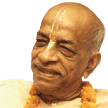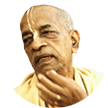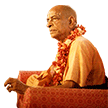Conviction - an essential subject: Difference between revisions
(Created page with "===Template for a New Page=== Category:Essential Subjects <!----------------------- edit below this line -----------------------> <!------------------------ begin introduc...") |
(Vanibot #0041: Moves Choose Another box to the end) |
||
| Line 1: | Line 1: | ||
[[Category:Essential Subjects]] | [[Category:Essential Subjects]] | ||
<!----------------------- edit below this line -----------------------> | <!----------------------- edit below this line -----------------------> | ||
<!------------------------ begin introduction text ------------------------> | <!------------------------ begin introduction text ------------------------> | ||
By proper conviction and intelligence one should gradually cease sense activities. This is called pratyāhāra. The mind, being controlled by conviction, meditation, and cessation from the senses, should be situated in trance, or samādhi. The process of purifying the senses is by the yogic way, namely the gross senses are merged in the mode of ignorance, and the subtle senses are merged in the mode of passion. The mind belongs to the mode of goodness and therefore is called devamaya, or Godly. Perfect purification of the mind is made possible when one is fixed in the conviction of being the eternal servitor of the Lord. Therefore simple attainment of goodness is also a material mode; one has to surpass this stage of material goodness and reach the point of purified goodness, or vasudeva-sattva. This vasudeva-sattva helps one to enter into the kingdom of God. | |||
Srila Prabhupada's books, lectures, conversations and letters offer a comprehensive presentation of this essential subject as seen in the '''[[Vaniquotes:Category:Conviction| | Srila Prabhupada's books, lectures, conversations and letters offer a comprehensive presentation of this essential subject as seen in the Vaniquotes '''[[Vaniquotes:Category:Conviction|Conviction]]''' category. An introduction from his books is given below in the following 10 quotes. | ||
<!-------- end introduction text and don't touch next three lines ---------> | <!-------- end introduction text and don't touch next three lines ---------> | ||
---- | ---- | ||
== Quotes from Srila Prabhupada's books == | == Quotes from Srila Prabhupada's books == | ||
<!----------------- edit quote boxes below this line -----------------> | <!----------------- edit quote boxes below this line -----------------> | ||
{{VaniQuotebox| | {{VaniQuotebox|The 5 elements, false ego, intelligence, the unmanifested, the 10 senses & the mind, the 5 sense objects, desire, hatred, happiness, distress, the aggregate, the life symptoms & convictions are considered to be the field of activities & its interactions|The five great elements, false ego, intelligence, the unmanifested, the ten senses and the mind, the five sense objects, desire, hatred, happiness, distress, the aggregate, the life symptoms, and convictions—all these are considered, in summary, to be the field of activities and its interactions. '''(Bhagavad-gītā 13.6-7)'''}} | ||
{{VaniQuotebox| | {{VaniQuotebox|Living symptoms represented by consciousness and conviction|The living symptoms, represented by consciousness and conviction, are the manifestation of the subtle body-mind, ego and intelligence. These subtle elements are included within the field of activities. '''(Bhagavad-gītā 13.6-7)'''}} | ||
{{VaniQuotebox| | {{VaniQuotebox|One should first, with all conviction, believe in Sri Krsna, and without making efforts to realize Him by speculative philosophy, one should prefer to hear about Him from the Srimad Bhagavad-gita and later from the text of the Srimad-Bhagavatam|One should first, with all conviction, believe in the Personality of Godhead Śrī Kṛṣṇa, and without making efforts to realize Him by speculative philosophy, one should prefer to hear about Him from the Śrīmad Bhagavad-gītā and later from the text of the Śrīmad-Bhāgavatam. '''(Śrīmad-Bhāgavatam 2.9.18)'''}} | ||
{{VaniQuotebox| | {{VaniQuotebox|Gradually, step by step, one should become situated in trance by means of intelligence sustained by full conviction, and thus the mind should be fixed on the self alone and should think of nothing else|Gradually, step by step, one should become situated in trance by means of intelligence sustained by full conviction, and thus the mind should be fixed on the self alone and should think of nothing else. '''(Bhagavad-gītā 6.25)'''}} | ||
{{VaniQuotebox| | {{VaniQuotebox|Bhakti-yoga begins if a person has the firm conviction that simply discharging devotional service to the Lord in full transcendental love can elevate him to the highest perfectional stage of life|The paramahaṁsa stage of life can be attained only by those who are fixed in the practice of bhakti-yoga. This bhakti-yoga begins if a person has the firm conviction that simply discharging devotional service to the Lord in full transcendental love can elevate him to the highest perfectional stage of life. '''(Śrīmad-Bhāgavatam 2.9.18)'''}} | ||
{{VaniQuotebox| | {{VaniQuotebox|By realized knowledge, one becomes perfect. By transcendental knowledge one can remain steady in his convictions, but by mere academic knowledge one can be easily deluded and confused by apparent contradictions|A Kṛṣṇa conscious person has realized knowledge, by the grace of Kṛṣṇa, because he is satisfied with pure devotional service. By realized knowledge, one becomes perfect. By transcendental knowledge one can remain steady in his convictions, but by mere academic knowledge one can be easily deluded and confused by apparent contradictions. '''(Bhagavad-gītā 6.8)'''}} | ||
{{VaniQuotebox| | {{VaniQuotebox|The first requirement is faith; it is due to faith that one associates with pure devotees, and, by such association, develops devotional service. As devotional service develops, one's misgivings diminish. Then one is situated in firm conviction|The first requirement is faith; it is due to faith that one associates with pure devotees, and, by such association, develops devotional service. As devotional service develops, one's misgivings diminish. Then one is situated in firm conviction, and from that conviction he develops a taste for devotional service and advances to the stage of attachment, whereby he follows the regulative principles of devotional service. '''(Teachings of Lord Caitanya, Chapter 13)'''}} | ||
{{VaniQuotebox| | {{VaniQuotebox|Rupa Gosvami instructs in Upadesamrta that one should execute devotional service with great enthusiasm, patience and conviction and follow the rules and regulations, keep oneself clean from material contamination and stay in the association of devotees|Śrīla Rūpa Gosvāmī has instructed in his Upadeśāmṛta that one should execute devotional service with great enthusiasm, patience and conviction and should follow the rules and regulations, keep oneself clean from material contamination and stay in the association of devotees. By following these six principles, one is sure to achieve the desired result of devotional service. '''(Kṛṣṇa Book, Chapter 20)'''}} | ||
{{VaniQuotebox|Unfortunately those proud of their academic education, despite so much evidence in Vedic literatures, stick to their obstinate conviction that Krsna is an ordinary person|Unless one is in the disciplic succession, he cannot understand Bhagavad-gītā. It is not possible by so-called academic education. Unfortunately those proud of their academic education, despite so much evidence in Vedic literatures, stick to their obstinate conviction that Kṛṣṇa is an ordinary person. '''(Bhagavad-gītā 10.12-13)'''}} | |||
{{VaniQuotebox|When one reaches a finer version of ignorance, he falsely thinks of himself as the Supreme Lord. That egoistic conviction of the conditioned soul is the last snare of the illusory energy which controls the entire material world|The activities of the false ego are based on the objective of the body and mind. Most persons conducted by the false ego are controlled by Lord Śiva. When one reaches a finer version of ignorance, he falsely thinks of himself as the Supreme Lord. That egoistic conviction of the conditioned soul is the last snare of the illusory energy which controls the entire material world. '''(Śrīmad-Bhāgavatam 3.6.25)'''}} | |||
<!----------------- edit quote boxes above this line -----------------> | <!----------------- edit quote boxes above this line -----------------> | ||
| Line 32: | Line 35: | ||
'''Conviction - [[Vaniquotes:Category:Conviction|explore more within this category]]'''. | '''Conviction - [[Vaniquotes:Category:Conviction|explore more within this category]]'''. | ||
{{EsentialSubjectTotal}} | |||
<div style="float:left;"> | |||
{{EssentialSubjectnav}} | |||
</div> | |||
__NOTOC__ | __NOTOC__ | ||
__NOEDITSECTION__ | __NOEDITSECTION__ | ||
Latest revision as of 16:02, 22 November 2020
By proper conviction and intelligence one should gradually cease sense activities. This is called pratyāhāra. The mind, being controlled by conviction, meditation, and cessation from the senses, should be situated in trance, or samādhi. The process of purifying the senses is by the yogic way, namely the gross senses are merged in the mode of ignorance, and the subtle senses are merged in the mode of passion. The mind belongs to the mode of goodness and therefore is called devamaya, or Godly. Perfect purification of the mind is made possible when one is fixed in the conviction of being the eternal servitor of the Lord. Therefore simple attainment of goodness is also a material mode; one has to surpass this stage of material goodness and reach the point of purified goodness, or vasudeva-sattva. This vasudeva-sattva helps one to enter into the kingdom of God.
Srila Prabhupada's books, lectures, conversations and letters offer a comprehensive presentation of this essential subject as seen in the Vaniquotes Conviction category. An introduction from his books is given below in the following 10 quotes.
Quotes from Srila Prabhupada's books
Conviction - explore more within this category.
Vanipedia has now over 903 introductory articles compiled from Srila Prabhupada's books under the series titled Essential Subjects. All these articles can be seen in the Table of Content on the right side of this article and also here in this Umbrella Category. Browse through them to relish the breadth and depth of Srila Prabhupada's teachings - There is a subject for everyone.









